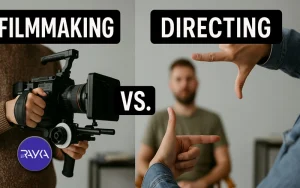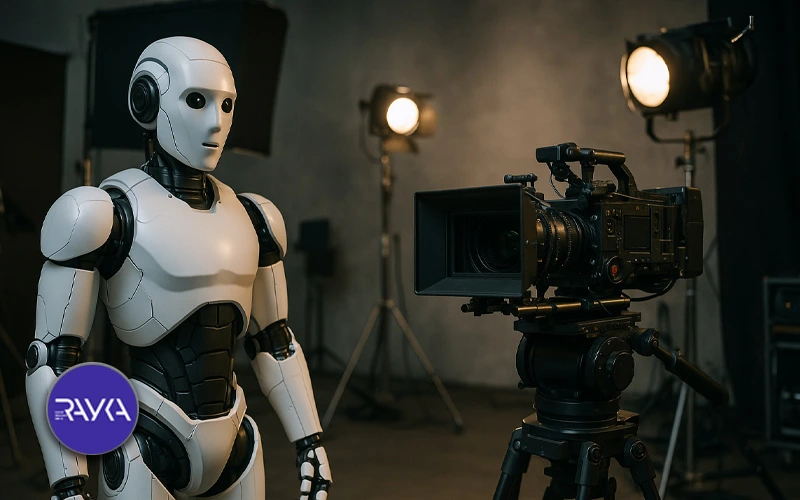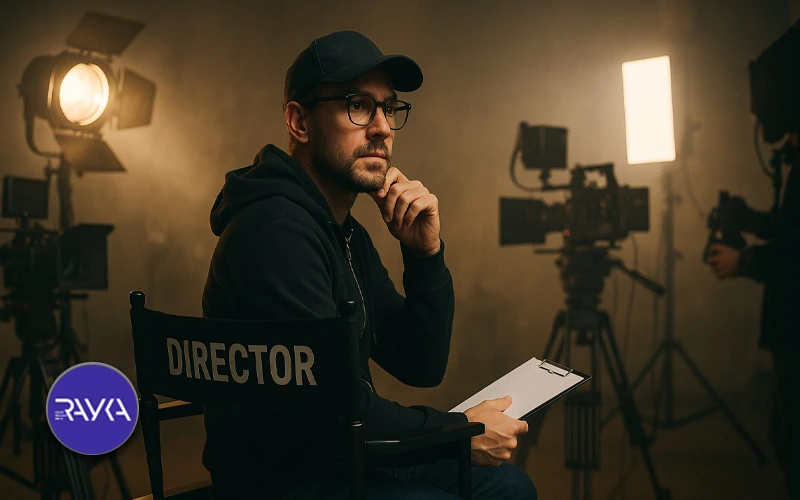Raicamah leverages AI to offer promotional video production, automated editing, creative teaser creation, and management of filmmaking projects.

The difference between a director and a filmmaker is one of the important questions that many cinema and content production enthusiasts are curious about. These two roles seem close to each other on the surface, but in fact they have different duties and responsibilities, each of which plays a key role in the creation of a visual work. In this article, we will thoroughly and accurately examine the differences, similarities, and various roles of a director and a filmmaker to get a clear view of these two concepts.
Filmmaking is the process of creating a visual work, which includes ideation, planning, production, and editing of the film. A filmmaker is responsible for managing all stages of film production from start to finish and overseeing the overall process of the project. Filmmaking is not limited to just shooting images; it also includes choosing the subject, writing the script, budgeting, and coordinating between different teams.
With a thorough understanding of technical and artistic tools, the filmmaker tries to create a film that conveys the desired message to the audience and creates an engaging and impactful experience.
Filmmaking requires a wide variety of skills, each of which helps create a quality work. The most important characteristics of filmmaking include the following:
Filmmaking has many and varied applications in today’s world that go beyond the cinema and television industry. Before introducing the applications, we must say that filmmaking is used as a powerful tool in conveying messages, education, and advertising. Below, we will review the most important applications of filmmaking:
Today, artificial intelligence has provided powerful tools to help filmmaking. This technology can help with script writing, editing, animation, and special effects. However, AI cannot completely replace human creativity and decision-making.
In practice, AI helps filmmakers and directors to complete the production process faster and more accurately. For this reason, companies like Rayka Mah are using AI to produce high-quality and efficient promotional videos and trailers.

Directing is the process of directing and supervising the execution of a film. The director is responsible for the precise execution of the script and the transformation of ideas into real images. He decides how the actors will perform their roles, how the scenes will be arranged, and how the emotions and message of the story will be conveyed in the best possible way.
The director acts like the leader of a group and is responsible for coordinating the technical team and the actors to ultimately make a quality and effective film.
A successful director has certain characteristics that enable him to lead the team and make an effective film. The most important characteristics of a director are:
The director plays a key role in directing and managing the film production. He is responsible for overseeing all stages of the film’s production and collaborating with various teams to ensure that ideas are implemented in the best possible way. Below are the most important duties of a director.
The director must make careful planning before filming begins. This includes reviewing the script, selecting locations, and setting a precise schedule. Proper preparation will ensure that the film’s production goes smoothly and on time.
One of the most important duties of a director is to guide the actors. He must prepare the actors for their roles and help them express their emotions and personalities correctly. Accurate guidance of the actors makes the performances natural and effective.
The director must continuously collaborate with the cinematographer, production designer, sound engineer, and other members of the technical team. He must ensure that all technical details are executed according to his vision. This collaboration ensures that the quality of the film is maintained at the desired level.
During the production process and even later in the editing stage, the director is responsible for checking the final quality of the film. He must make sure that all the elements of the film are put together in the best possible way and that the message of the film is conveyed correctly. Final quality control ensures the success of the film in attracting the audience.
Filmmaking and directing are both key roles in film production, but they have fundamental differences. Both are related to the creation of a work of art and storytelling and require creativity and technical skills. However, filmmaking encompasses the entire process of film production, from ideation to release, while directing focuses more on the artistic and executive aspects.
Their main similarity lies in the ultimate goal; To produce a film that conveys a specific message to the audience. Both roles require close collaboration with a team and the ability to manage the project. However, in practice, the filmmaker may have broader responsibilities such as securing funding and overall project management, while the director focuses more on executing the scenes and directing the actors.

To better understand the difference between a director and a filmmaker, we have provided a concise and accurate comparison in the form of a table. This table clearly and simply highlights the key points and important differences between the two roles, so that you can get a complete overview of the duties and focus of each.
| Aspect | Filmmaking | Directing |
|---|---|---|
| Definition | The overall process of producing a film from concept to distribution | Guiding and managing the artistic execution of a film |
| Primary Focus | Planning, project management, and production | Leading actors and the technical crew on set |
| Key Responsibilities | Securing funding, assembling the team, overseeing the entire project | Directing actors, staging scenes, ensuring artistic quality |
| Timeline of Involvement | From the initial idea through to final release | Primarily during production and post-production stages |
| Required Skills | Project management, budgeting, extensive communication | Artistic creativity, leadership, quick decision-making |
Both directors and filmmakers work closely together in the process of making a film, but their duties are different and complementary. In the following section, we will examine and compare the duties of both in detail.
The filmmaker is responsible for managing the entire project. He plans, provides the necessary resources, and provides overall coordination between teams. The filmmaker designs the film production roadmap and ensures that the project progresses according to budget and schedule.
The director focuses more on the artistic and executive aspects. He guides the actors, designs the sets, and ensures the artistic quality of the film. The director must portray the mood and atmosphere of the story in the best possible way and control the executive details.
The difference between a director and a filmmaker lies in their responsibilities and work focus. The filmmaker is the project manager and planner of the entire production process, while the director focuses on the artistic side, directing the actors and executing the scenes. Both roles are vital to making a successful film and must work in perfect harmony.
Ultimately, understanding the differences and roles of each will help to improve the filmmaking process and make the final work of higher quality.
No, a filmmaker manages the overall project, while a director focuses mainly on the artistic guidance of the film.
Yes, filmmaking relies more on management and planning skills, and one can succeed without directing experience.
AI is more applied in filmmaking for editing, visual effects, and process optimization.
For short promotional videos, a director is more needed to create engaging content and guide execution.
Raicamah leverages AI to offer promotional video production, automated editing, creative teaser creation, and management of filmmaking projects.